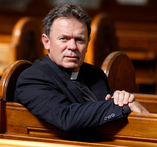Unlike so many clerics, at least Reverend Glynn Cardy is clear about who he thinks should be the arbiter of our moral values. Not God; not the Bible – perish the thought; not the church; and not traditional societal mores accumulated over centuries. The guardian of our ethical boundaries is the society one happens to find oneself in as it exists now; tomorrow it could all change.
So today, in the West, since gay marriage is legal the church must get in step with society and accept gay marriage; according to Cardy, this demonstrates that the church has “a strong moral compass.”
If Cardy really insists on taking his moral cues from societal surroundings, in Egypt he would be favour bombing churches, in Iran hanging homosexuals and in Saudi Arabia not allowing women to drive.
The fact that churches holding fast to revealed truth are growing and churches which have surrendered to the Zeitgeist are floundering on the precipice of extinction – in step with their societies – seems to have escaped Rev. Cardy.
 From here:
From here:
An outspoken Auckland vicar says the Anglican Church is in danger of becoming a moral dinosaur and is increasingly seen as irrelevant with the passing of the Gay Marriage Bill.
Reverend Glynn Cardy said that with the passing of the law, the state had moved well ahead of the church.
[…..]
The vicar said his comments were in relation to the church’s position on gay and lesbian people getting married or ordained when they have partners.
“It’s really about when the church gets out of step with society and society loses confidence in the church as having a strong moral compass.
“I think the church for many years has been seen as a model that tries to promote good values in society and I think the church has done that well in times in pointing our different issues of justice and promoting honesty and kindness,” he said.
“I think that society and science have said that gay people should be treated like anyone else and if the church continues to discriminate the confidence society has in it will diminish.”
He said the church could be left behind “as a relic” and needed to change to have society’s confidence as a moral body to be listened to.

